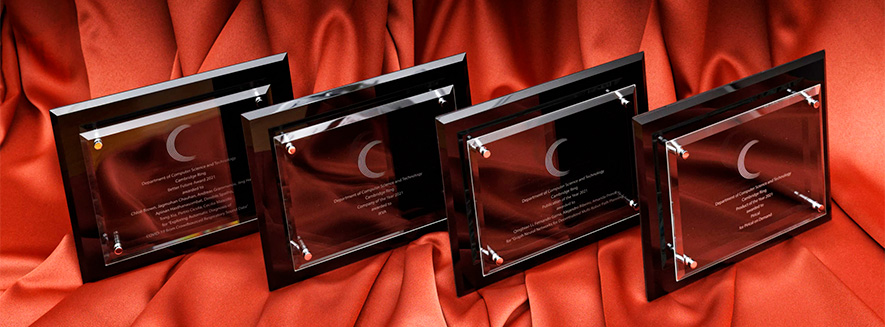
Submitted by Rachel Gardner on Thu, 07/04/2022 - 22:30
A tool for diagnosing Covid from recordings of coughing and breathing sounds; a novel AI-powered knowledge discovery business; a demonstration of ways to use Graph Neural Networks to plot the pathways of swarms of autonomous robots; and an analytics tool that helps HR directors with recruitment, and inclusion and diversity in their workforces. These are the winners of our Hall of Fame Awards 2021.
The Hall of Fame is the group of companies set up by students, staff and alumni of this Department – and there are now over 300 of them. "We are very proud of this," says Ben Karniely, coordinator of our alumni association, the Cambridge Ring. "It is an indication of the impact that our Department has on the computing industry and the world of technology."
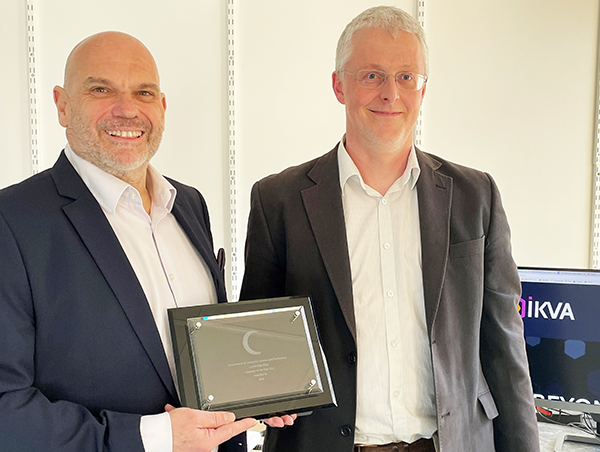 The 2021 awards ceremony took place on Thursday 7 April at a Cambridge Ring dinner at Queens' College Cambridge. The awards were presented to the winners by our guest speaker, alumna Rosemary Francis, Chief Scientist at Altair. The awards are given in four categories:
The 2021 awards ceremony took place on Thursday 7 April at a Cambridge Ring dinner at Queens' College Cambridge. The awards were presented to the winners by our guest speaker, alumna Rosemary Francis, Chief Scientist at Altair. The awards are given in four categories:
- the company of the year;
- the product of the year;
- the publication of the year (from among those produced by members of the Department);
- and the Better Future Award – which is intended to recognise those who have made significant contributions to humanity through technology.
The Company of the Year Award was presented to iKVA – a start-up founded by three academics here: Dr Liang Wang and Profs Richard Mortier and Jon Crowcroft. (See CEO Jon Horden, CEO, and co-founder Richard Mortier with their award, right.) iKVA’s Intelligent Insight SaaS platform processes unstructured, unlabelled text using document embedding and MRPT indexing to enable embedding of knowledge management features in everyday tools and workflows. Current embeddings include plugins for Google Chrome, Mozilla Firefox, and Microsoft Word, and the platform's capabilities include:
- searching – finding the closest-matches to a query document without having to figure out the right keywords and without needing the query document to be in the same language as the set being searched
- visualisation – flexibly exploring the relationships among textual data
- ontology management – reducing the cost and complexity of maintaining legacy knowledge management systems
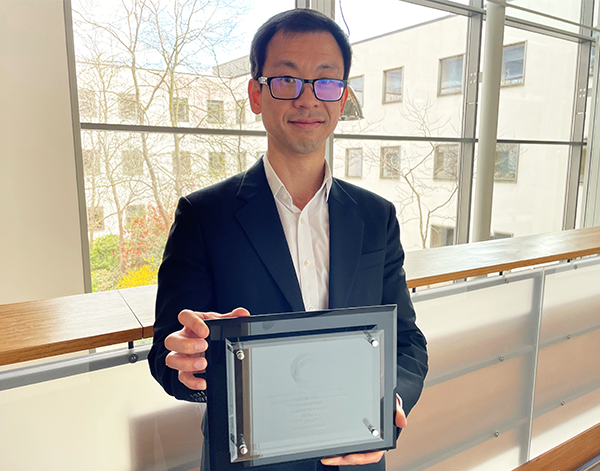 iKVA’s core technology has been proven through proof of concepts with large organisations and its customers so far include engineering giant Mott MacDonald and Cambridge University Library.
iKVA’s core technology has been proven through proof of concepts with large organisations and its customers so far include engineering giant Mott MacDonald and Cambridge University Library.
The Product of the Year Award was presented to Pirical On Demand, a tool for HR decision-makers that uses client firms' live data. (See Hok-Him Poon, founder and CTO, with the award, right.)
Pirical On Demand has been developed with, and is used by, top international legal and professional services firms. HR professionals use Pirical On Demand to benchmark statistics against competitors, to analyse bias in recruitment and work allocation systems, and for real-time or predictive capabilities like highlighting which employees may need extra support.
The Better Future Award was presented to researchers Chloe Brown, Jagmohan Chauhan, Andreas Grammenos, Jing Han, Apinan Hasthanasombat, Dimitris Spathis, Tong Xia, Pietro Cicuta and Prof Cecilia Mascolo. They received it for their work on ways of using AI automatically to diagnose Covid-19 from recordings of coughing and breathing sounds. (Below: Tong Xia, centre, and Cecilia Mascolo, right, are seen receiving their award from Rosemary Francis.)
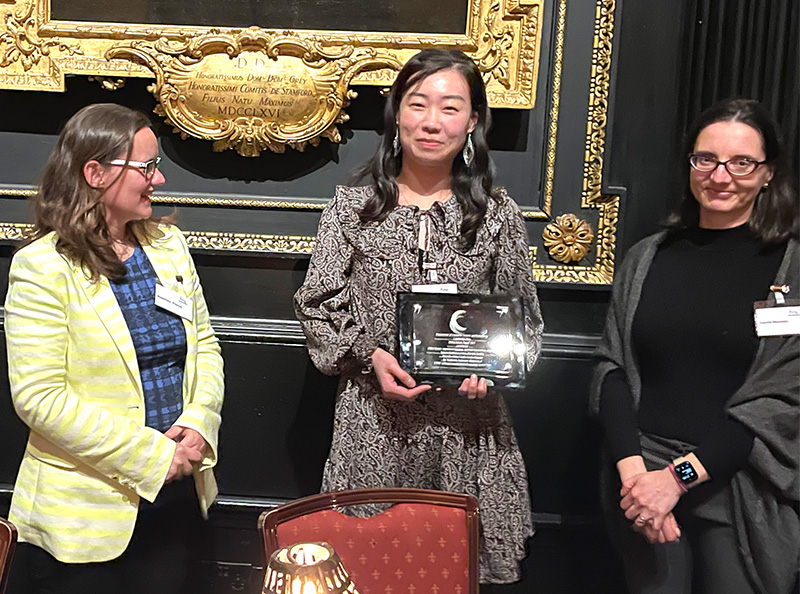 Audio signals generated by the human body (e.g., sighs, breathing, heart, digestion, vibration sounds) have routinely been used by doctors as indicators to diagnose disease or assess disease progression. Until recently, such signals were usually collected by a doctor during an appointment with a patient. But research has now started to use digital technology to gather bodily sounds (e.g., from digital stethoscopes) for cardiovascular or respiratory examination, which could then be used for automatic analysis. Some initial work shows promise in detecting diagnostic signals of COVID-19 from voice and coughs.
Audio signals generated by the human body (e.g., sighs, breathing, heart, digestion, vibration sounds) have routinely been used by doctors as indicators to diagnose disease or assess disease progression. Until recently, such signals were usually collected by a doctor during an appointment with a patient. But research has now started to use digital technology to gather bodily sounds (e.g., from digital stethoscopes) for cardiovascular or respiratory examination, which could then be used for automatic analysis. Some initial work shows promise in detecting diagnostic signals of COVID-19 from voice and coughs.
The researchers collected a large-scale crowdsourced dataset of respiratory sounds via their Covid-19 Sounds app to aid diagnosis of Covid-19. In their paper (Exploring Automatic Diagnosis of COVID-19 from Crowdsourced Respiratory Sound Data) the researchers describe their data analysis. They used coughs and breathing to understand how discernible Covid-19 sounds are from those in asthma or in healthy control subjects. They showed that even a simple binary machine learning classifier is able to classify correctly healthy and Covid-19 sounds. They also showed how they distinguished a user who tested positive for COVID-19 and had a cough from a healthy user with a cough, and users who tested positive for COVID-19 and had a cough from users with asthma and a cough. Their work opens the door to further investigation of how automatically-analysed respiratory patterns could be used as pre-screening signals to aid Covid-19 diagnosis.
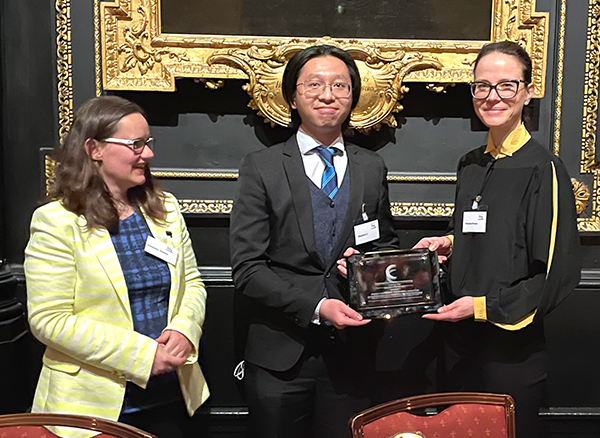 Publication of the Year: Graph Neural Networks for Decentralized Multi-Robot Path Planning. Qingbiao Li, Fernando Gama, Alejandro Ribeiro, Amanda Prorok.
Publication of the Year: Graph Neural Networks for Decentralized Multi-Robot Path Planning. Qingbiao Li, Fernando Gama, Alejandro Ribeiro, Amanda Prorok.
This paper addresses the issue of learning to coordinate autonomous agents through graph neural networks (GNNs). The problem of coordinating autonomous agents is notoriously hard but Professor Amanda Prorok (pictured right with Qingbiao Li) and her team, with colleagues at the University of Pennsylvania, tackled it by proposing a learning-based solution that leverages a GNN to produce decentralized decision-making policies.
They demonstrated the power of their solution on the problem of multi-agent path finding: the method performs near-optimally, at a fraction of the computational cost when compared to state-of-the-art benchmarks. They also showed that the method scales to arbitrarily large problem instances. The video that accompanies the academic paper has over 1,500 views on YouTube.

